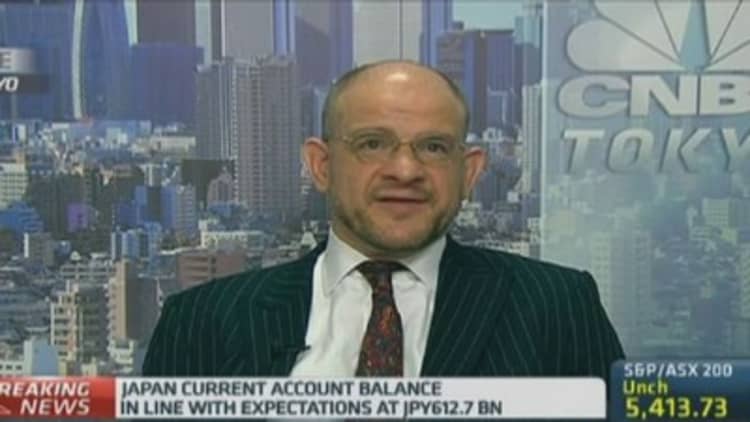
Japan's current account balance shifted to a surplus in February for the first time in five months but economists warn of a return to deficits as exports to emerging markets remain weak.
The surplus stood at 612.7 billion yen, slightly less than the median estimate for a 628.0 billion yen surplus, Ministry of Finance data showed, and marked a turnaround from a record deficit of 1.6 trillion yen in the previous month.
Read More BOJ seen upbeat despite Japan slowdown
The surplus should be welcome news for policymakers as a recent string of deficits had thrown the spotlight back on Tokyo's ability to service its huge debt.
Still, analysts don't expect a sustained improvement in the current account balance as Japan continues to import more gas and oil to make up for the closure of its nuclear power industry after the March 2011 earthquake and nuclear disaster.
Moreover, income from exports has been crimped as many manufacturers have moved factories overseas in recent years.
"I do not think that we have convincingly put current account deficits behind us," said Shuji Tonouchi, senior fixed income strategist at Mitsubishi UFJ Morgan Stanley Securities.
"This is a temporary improvement. Policymakers have been saying that as long as advanced economies recover Japan's exports will improve, but weakness in emerging markets means exports are not picking up."
Compared to a year ago, the current account surplus fell 5.7 percent, the data showed on Tuesday.
Read More
The balance returned to a surplus as imports grew an annual 14.1 percent, slower than a 30.3 percent increase in the year to January.
Exports also slowed to 15.7 percent annual growth in February from a 16.7 percent annual rise in the January, showing that overseas demand is not strong.
The Bank of Japan is expected to desist from expanding stimulus on Tuesday, holding fast to existing plans to beat chronic deflation even as a sales tax hike clouds the outlook for the world's third-largest economy.
Japan's current account balance came under pressure last year as the trade balance recorded a string of deficits due to the rising energy bill and disappointing exports.
Read More Have investors been too harsh on Japan?
These factors, including a structural shift in some manufacturing to overseas, have diminished Japan's status as an export-led economy.
A low current account surplus, or a return to deficit, would also show that Japan's status as a net creditor to the world is in doubt, which could raise questions about how it will fund its outstanding government debts.
Years of fiscal stimulus to revive a stagnant economy and surging social welfare costs for a rapidly ageing population have saddled Japan with the worst ratio of government debt to gross domestic product.
Japan's debt was at 1,017 trillion yen last year, cementing its ranking as the most indebted country in the industrialized world.

